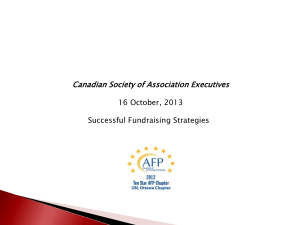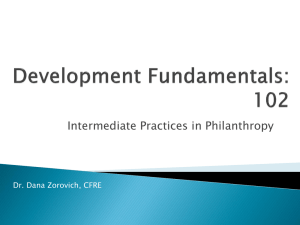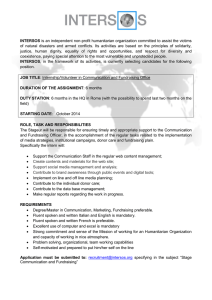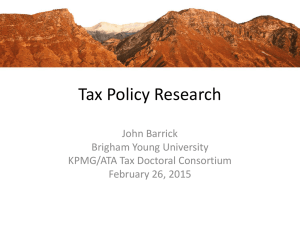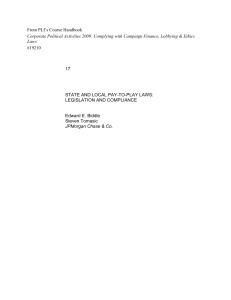Navigating Pay-to-Play Laws - Construction Industry Round Table
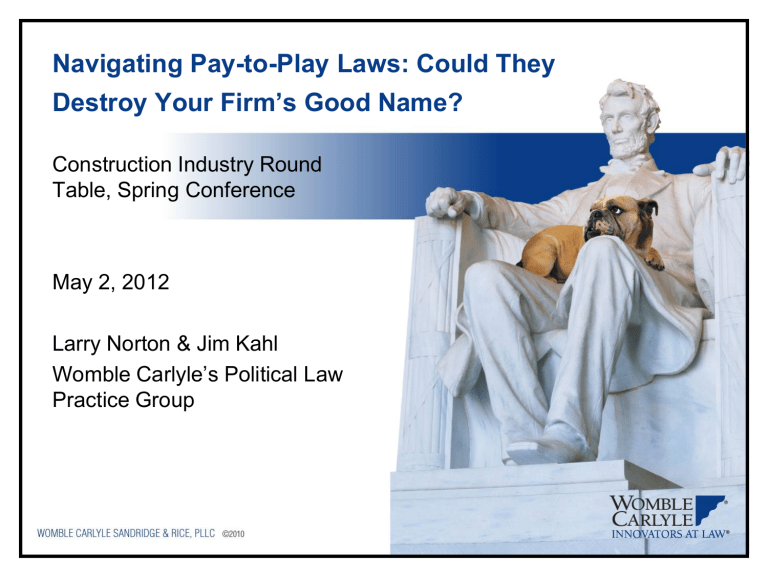
Navigating Pay-to-Play Laws: Could They
Destroy Your Firm’s Good Name?
Construction Industry Round
Table, Spring Conference
May 2, 2012
Larry Norton & Jim Kahl
Womble Carlyle’s Political Law
Practice Group
AGENDA
• Overview of Regulation and
Risks
• Pay-to-Play Laws
• Beyond Pay-to-Play:
Procurement and Goodwill
Lobbying
• Gifts to Public Officials
• Risk Management
2
INTERACTING WITH PUBLIC OFFICIALS,
CANDIDATES
• Complex scheme of federal, state and local laws
• Vary considerably
• Impact on business and personal activity
• Government contractors subject to special restrictions on contributions and gifts, as well as disclosure obligations
• Lobbying laws reach non-traditional activities – e.g., goodwill & procurement lobbying
• Gifts to public officials
3
WHY DO THESE LAWS
MATTER?
• Public sector clients are huge market
• Scrutiny by regulators, media, competitors, watchdog groups
• Charged political climate
• Civil and criminal penalties
• Loss of business/opportunities
• Harm to business reputation
4
POLITICAL CONTRIBUTIONS
5
GENERAL RULES FOR
CORPORATIONS
Prohibited under federal law
• No corporate contributions to federal officeholders and candidates, national parties, and federal PACs
• Exception – contributions by a corporate PAC
State laws vary
• A few states allow unlimited corporate contributions
• Prohibited in about 20 states
• Remaining states impose limits
• No limit on corporate spending in support of or opposition to ballot measures
6
GOVERNMENT CONTRACTORS
• Federal contractors prohibited from making contributions in federal elections, except through federal PAC
• Prohibition in force from beginning of negotiations through performance
• Draft Obama Executive Order
• State laws vary: some prohibit (Connecticut,
Illinois, South Carolina); others limit (Kentucky,
N.J., Ohio); many require disclosure
7
NO END RUNS ALLOWED
• Firm cannot reimburse contribution through salary increases, bonuses, or other means
• One firm official or employee cannot reimburse another
8
CORPORATE FACILITATION
• Corporate facilities or resources cannot be used for fundraising activities in support of federal officeholders or candidates
(unless paid by permissible source)
• Result: illegal in-kind contribution
• Common corporate violation
• Civil & criminal sanctions
9
RED FLAGS
• Enlist subordinates to handle invitations,
RSVPs for fundraising event
• Use customer lists for political fundraising
• Collect and forward checks to campaign
• Use company envelopes and postage
• Pay for cabs to fundraisers
• Refer to personal fundraising efforts in selfevaluations or strategic planning
10
WHAT IS A CORPORATE PAC?
• Non-partisan, tax-exempt entity that makes political contributions to officeholders, candidates, other PACs
• Bears corporate name; may receive solicitation & administrative financial support from corporation
• May also host fundraising events for officeholders and candidates
• Funded with voluntary contributions from qualified personnel, shareholders, members of the Board of Directors
• Special structure if parent is foreign company
11
WHY HAVE A CORPORATE PAC?
• Enhance company’s profile on important issues and public policy matters
• Support officeholders and candidates who understand your business and share your concerns
• Well-established way to make political contributions identified with your company
• Channel political activity away from areas of legal risk
12
FEDERAL CANDIDATE VISITS
• Company may allow federal candidate to appear at meeting or other corporate function
• May pay for meal associated with event
• Meeting with senior management only – may coordinate with candidate regarding message; may ask attendees to contribute
• Meeting with all employees – may not coordinate message; only the candidate may solicit contributions; must allow candidate for same office to appear, if request to do so
13
PAY-TO-PLAY LAWS
14
PAY-TO-PLAY: THE BASICS
• Prohibit or restrict political contributions by state and local contractors and bidders
• May also restrict fundraising
• Laws may apply to PACs, officers, directors, senior managers & even spouses and children
• Restrictions may begin before bid and end months after contract is terminated (“look-back” provision)
• Disclosure/registration/reporting
WHAT’S AT STAKE?
• Public sector clients are huge market
• Bids disqualified and contracts voided
• Fines and criminal penalties
• Employment issues
• Harm to business reputation
16
BEWARE OF IN-KIND CONTRIBUTIONS
• Home fundraising events
• Allowing campaign to use company’s facilities/equipment
• Sale of item or service at less than usual charge
• Purchase of fundraising tickets and items
• Loans
17
WHERE ARE PAY-TO-PLAY LAWS?
STATE LAWS
•
California
• Connecticut
• Florida
• Georgia (licensees)
•
Hawaii
•
Indiana (lottery contracts)
•
Illinois
• Kentucky
• Louisiana (hurricane contracts)
•
Maryland
•
Missouri
•
Nebraska
• New Jersey
• New Mexico
• Ohio
•
Pennsylvania
•
Rhode Island
•
South Carolina
• Vermont
• Virginia
• West Virginia
LOCAL LAWS
•
Oakland, City and County of L.A., Culver
City, San Francisco, County of San
Diego, plus Cal State Teachers
Retirement System, and Cal Public
Employees Retirement System
•
Chicago & Cook County
• Dallas, Houston, & San Antonio, plus
Teacher Retirement System of TX
• Denver
• Fort Lauderdale
•
New Jersey
– in over 165 cities & towns
•
New York City
• Philadelphia
18
PAY-TO-PLAY COMPLIANCE
PROGRAM
Develop a risk map
Notice to covered employees (some state-specific)
Contribution surveys to support reports and certifications
Pre-approval of some contributions
19
NEW FUNDRAISING VEHICLES
• Super PACs –
• 527’s
• 501(c)(4)’s
• Minimizing the risks
20
CONSIDERATIONS WHEN GIVING
TO ADVOCACY GROUPS
Due diligence
Avoid earmarking contributions and other conduit situations
Know the company you keep
Understand how disclosure works
Expenditures may not be coordinated with candidate or party
21
LOBBYING
22
LOBBYING LAWS MAY ALSO APPLY TO
GOVERNMENT CONTRACTORS
• Generating “goodwill”
• Procurement lobbying
• May require registration by contractor/employee
• Disclosure reports
• May trigger contribution, gift restrictions
23
WHAT IS PROCUREMENT LOBBYING?
• Attempt to influence purchasing or procurement decisions by government agencies, pension systems
• Generally cover:
Convince agency personnel of a need for products/services (“talking up” the service)
Seek an appropriation
Attempt to influence contents of an RFP
Dooropening (“goodwill lobbying”)
• In 2005, 18 states had procurement lobbying laws.
Today, 26 states and many municipalities.
24
COMMON EXCEPTIONS
• Responding to a formal request for bids or proposals
• Participating in a bid conference
• Small procurements
• Providing technical advice in response to a request by an agency official
• Some states require registration only if meeting with an official who has discretion to award or administer a contract
25
• Arkansas
• Connecticut
• Delaware
• Florida
• Georgia
• Idaho
• Illinois
• Indiana
• Kansas
• Kentucky
• Louisiana
• Maryland
• Massachusetts
STATES THAT REGULATE
PROCUREMENT LOBBYING
• Michigan
• Mississippi
• Missouri
• New Hampshire
• New Jersey
• New York
• North Carolina
• Ohio
• Pennsylvania
• Rhode Island
• Tennessee
• Texas
• Vermont
26
GOODWILL
LOBBYING
• Some sales activity may be subject to goodwill lobbying laws
• Meet with public officials to build relationships and generate goodwill, even if no effort a particular matter
• Examples:
NC – lobbying includes “building of relationships . . . with intention of influencing current or future legislative or executive action or both”
IL – Lobbying includes efforts to promote goodwill with high-level executive officials, their chiefs of staff and members of legislature
HI – register as lobbyist if purpose of meeting is “getting to know” or “establish rapport” with legislators
27
GIFT RESTRICTIONS
28
GIFTS TO PUBLIC OFFICIALS
AND EMPLOYEES
• Many states and localities impose special restrictions on gifts to public officials by government contractors and lobbyists
• Some states and localities require disclosure of gifts on periodic reports
• “Gifts” include meals, tickets to sporting or entertainment events, invitations to charitable fundraisers, etc.
29
FEDERAL LAWS
• Gifts to Members of Congress and
Congressional staff: $50/Gift and
$100/Year ($0 if hire federal lobbyist)
• Exceptions are available (Note that
House and Senate rules differ)
• Executive branch officials and employees: no gifts from “prohibited source” unless qualify for exception
• Obama appointees: no gifts from federal lobbyists or their employers
30
STATE LAWS
• All states have laws in this area
• Most stringent restrict gifts and require reporting
• Most lenient allow gifts of all sorts, but may require reporting over $ threshold
31
COMMON GIFT RULE EXCEPTIONS
• Personal friendship and hospitality
• Widely-attended gatherings and receptions
• Invitations to charitable fundraising events
• Promotional items
• Plaques
• Informational materials
• Benefits available to the general public
32
APPROACH TO COMPLIANCE
• Policies : Develop and disseminate simple and clear policies and procedures for political contributions, gifts, procurement activity, and use of corporate resources for fundraising
• Training : Provide regular training to key groups
(assist them to spot issues and ask questions)
• “Ask First” Culture : Encourage questions & make sure everyone knows who is responsible for answering political law questions
MORE COMPLIANCE TIPS
• Tracking systems : For gifts, political contributions & reportable payments
• Know the players : Identify who must file reports
& who can trigger violations. Don’t forget consultants!
• Separate responsibility : Keep government relations and compliance separate, if possible
• Legal Compliance Review: Identify risk areas, prioritize compliance needs
CONTACT INFORMATION
www.wcsr.com/politicallaw
Jim Kahl
JKahl@wcsr.com
(202) 857-4417
Larry Norton
LNorton@wcsr.com
(202) 857-4429
This presentation is intended to provide general information and should not be construed as providing legal advice or legal opinions. You should consult an attorney for specific legal questions.
